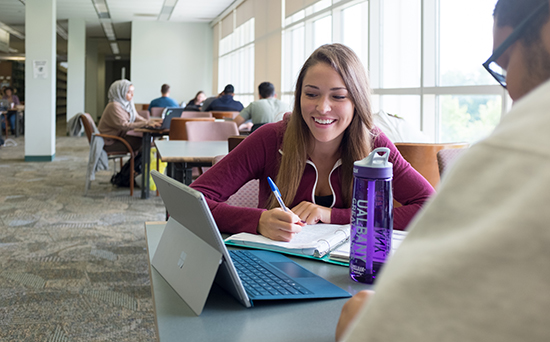Empowering Yourself in a Post-Truth World
UAlbany partners with Empire State College on SUNY Innovative Instruction Technology Grant to improve and extend online information literacy
 |
|
The metaliteracy MOOC learners will explore issues related to the post-truth era, such as false and misleading information, online hoaxes, confirmation bias and trolling. (Photo by Mark McCarty)
|
ALBANY, N.Y. (October 18, 2018) -- The University at Albany is partnering with SUNY Empire State College through a SUNY Innovative Instruction Technology Grant (IITG) to improve and extend online information literacy.
The project, “Advancing Metaliteracy in a Post-Truth World through the Design of a Global MOOC,” unites the two SUNY campuses in the design of a new Massive Open Online Course (MOOC) using the Open EdX platform. The MOOC will be a free resource, scalable across the entire SUNY system and open to lifelong learners globally.Through the course, “Empowering Yourself in a Post-Truth World,” learners will explore issues related to the post-truth era, such as false and misleading information, online hoaxes, confirmation bias, personal privacy, tribalism – when groups identify so closely that they fail to consider other perspectives, and online “trolling,” being deliberately inflammatory online.
Awarded on a competitive basis, IITG research projects must enhance, support and extend innovative and collaborative online teaching and learning environments, and also must have the strongest potential to be replicated across SUNY’s 64 campuses. The metaliteracy project earned a Tier III award of $60,000. The project is led by Empire State College Professor of Arts and Media Thomas P. Mackey, and University at Albany Distinguished Librarian Trudi Jacobson.
“Metaliteracy,” a concept developed by Mackey and Jacobson, reinvents information literacy by empowering learners beyond the search and retrieval of static documents to the collaborative production and sharing of dynamic information online.
"Metaliteracy provides an overarching and self-referential framework that integrates emerging technologies and unifies multiple literacy types," said Jacobson. "This redefinition of information literacy expands the scope of generally understood information competencies and places a particular emphasis on producing and sharing information in participatory digital environments."
This MOOC expands the current Metaliteracy digital badging system with new content and will feature the Metaliteracy learning goals and objectives to support reflective and critical thinking. The team also includes co-principal investigators Kelsey O’Brien, information literacy librarian at UAlbany, and Christine Paige, director of instructional design at SUNY Empire.
Dr. Mackey and Ms. Jacobson originated the metaliteracy framework that will inform this MOOC and have published extensively on this topic. They have also been invited to present their research on metaliteracy at national and international conferences. Metaliteracy gained further prominence when it influenced the Framework for Information Literacy for Higher Education from the Association for College & Research Libraries (ACRL).
In fall 2018, the American Library Association (ALA) will publish the next book edited by Mackey and Jacobson, Metaliterate Learning for the Post-Truth World.
O’Brien has played a central role in developing the metaliteracy digital badging system and has contributed to previous Metaliteracy MOOC projects as well. She will bring her significant experience with educational technology and instructional design in the expansive online program at SUNY Empire State College to the project.
![]() For more news, subscribe to UAlbany's RSS headline feeds
For more news, subscribe to UAlbany's RSS headline feeds
A comprehensive public research university, the University at Albany-SUNY offers more than 120 undergraduate majors and minors and 125 master's, doctoral and graduate certificate programs. UAlbany is a leader among all New York State colleges and universities in such diverse fields as atmospheric and environmental sciences, business, education, public health,health sciences, criminal justice, emergency preparedness, engineering and applied sciences, informatics, public administration, social welfare and sociology, taught by an extensive roster of faculty experts. It also offers expanded academic and research opportunities for students through an affiliation with Albany Law School. With a curriculum enhanced by 600 study-abroad opportunities, UAlbany launches great careers.


